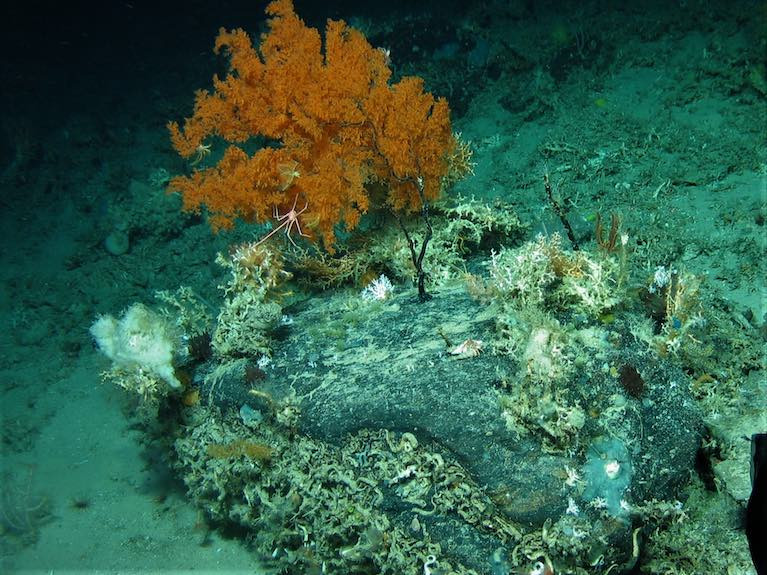Irish cold-water corals can survive in extreme conditions within Ireland’s largest submarine canyon on the Porcupine Bank, a new study has found.
The coral even grows on precipices of high cliffs, and can withstand sea current speed of over 114 centimetres per second, according to the study published today in the science journal Nature.
This is the highest current speed ever recorded in a cold water habitat, according to University College Cork(UCC) scientist Dr Aaron Lim who led the research.
 An example of a 3D reconstruction of a cold-water coral habitat from -750 m water depth at the Porcupine Bank Canyon Photo: Aaron Lim
An example of a 3D reconstruction of a cold-water coral habitat from -750 m water depth at the Porcupine Bank Canyon Photo: Aaron Lim
Dr Lim’s team used the Holland 1 remotely operated vehicle (ROV) on the State research ship Celtic Explorer to explore how coral are living in the Porcupine Bank Canyon which is 3,500 metres deep.
 The Marine Institue's Holland 1 ROV being deployed from the RV Celtic Explorer as it 'holds' the deep sea monitoring system (attached to the front) before descending to the deep sea Photo: Aaron Lim
The Marine Institue's Holland 1 ROV being deployed from the RV Celtic Explorer as it 'holds' the deep sea monitoring system (attached to the front) before descending to the deep sea Photo: Aaron Lim
He was part of the 2018 expedition which explored and mapped the canyon some 320 km west of Kerry, finding it full of cold-water corals forming reefs and mounds which create a rim on the lip of the canyon.
This latest expedition found coral in a range of deep marine settings.
The scientists had to use deep marine monitoring stations and three-dimensional reconstructions as part of the work. .
“These cold-water corals are growing at the very edge of a near-vertical cliff face, in Ireland’s largest submarine canyon some 850 m below the surface in very intense conditions. They’re quite literally living on the edge,” Dr Lim said.
 UCC's deep sea monitoring system at the edge of the submarine canyon where it collects marine environmental data for months at a time
UCC's deep sea monitoring system at the edge of the submarine canyon where it collects marine environmental data for months at a time
As he explained, cold-water corals help to form deep-water reefs and mounds which can range from as little as ten metres to over 100 m high.
Some coral mounds have existed offshore Ireland for 2.6 million years, he said.
“Some of these habitats were predominantly alive, while others were mostly dead and so the aim of the study was to understand what is driving this?” Dr Lim said.
UCC marine geologist Luke O’Reilly described the canyon as “a strange-place; deep, dark and cold but full of life”.
“Together with the Marine Institute, we developed a monitoring system which could withstand these pressures and conditions for months at a time,” O’Reilly said.
Prof Andy Wheeler, head of UCC’s school of biological, earth and environmental sciences, noted that the coral can cope with the strong sea currents, but tend to feed when it slows down – such as when the tide turns.
The team have recently deployed monitoring stations in the canyon to gather information on survival over longer time scales.
The research was funded by Science Foundation Ireland and Horizon 2020, with co-funding by the Marine Institute and Geological Survey, Ireland. Shiptime was funded by the Marine Institute's National Shiptime Programme.
The study is published here

































































